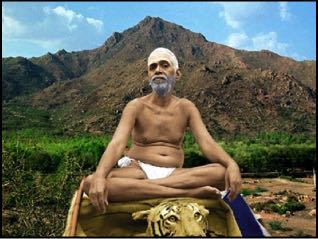
Letter # 10 - The First Rung on the Ladder (continued)
By responsibility, we do not mean the obvious ones where we are called out by a member of the family, an associate or invariably, an enemy for our public shortcomings but also all actions in which we are involved however peripheral. We all contribute to situations that evolve. For example, our politicians are to some extent reflections of our group aspirations. Each nation has a leader who replicates what the majority may think or feel.
We are the world and what we do or think affects, in however minuscule a way, everything and everyone else. Once we accept responsibility in whatever form it may arise, we have taken the first valuable step on the ladder.
When I first came to Arunachala, my head was full of fabulist thoughts. I had an unrealistic opinion of myself that others who were there at Arunachala proceeded to point out in kind of subtle and not-so-subtle ways. It was painful but necessary.
We sometimes read that we should be thankful to others for pointing out our defects. This is all very well in theory but the reality is another country. Bitterness is often the result of the purging.
But that will pass if we persist.
Which brings us back to a critical point. Concurrent with the acceptance of responsibility in however microscopic a manner, the overriding principle has been set in place. A principle is not a question of quantity but of quality. If we can do a simple task such as sweeping the floor well, it is a momentous start. If we can wash a dish immaculately, it is a start. We begin on the most mundane, simple level. We bring to bear all our attention on doing the humblest task well. We start at zero.
What we do discover is that even when we try to do the simplest task, our attention wavers. I remember reading a book that stated the claim that even to keep our focus on the dials of a watch for one minute is impossible. I tried it and much to my disbelief, failed. If I could not do that, how ever could I follow a train of thought back to its source using the technique of Who Am I?
In those first months at Arunachala, I realised that I was a bundle of undisciplined nerves that fired off unconscious, unintelligent reactions, I could not help myself and was a victim of my delusions.
But two valuable insights arose from the turmoil. One, I was responsible for who I was no matter the circumstances, for nobody got me into the emotional mess I found myself in except me. And two, I realised an instrument was required to focus the mind on fighting the raging war beneath the surface. The Bhagavad Gita was not wrong. We are at war with ourselves. The question is how do we overcome our adversities? And for that, we need to know what they are.
We are oblivious to the currents around us that we inadvertently create. We live mostly in our dream world. Until we become desperate to awaken, we cannot escape. And to do that, we require the power of attention. It is like a muscle. If we exercise a muscle, it can grow stronger and more resilient. If we do not exercise our power of discrimination, it becomes flabby and inconsequential.
In the case of many, it was the power of Arunachala Ramana that became the fulcrum of the breakout.
_______________________
1 TS Eliot, The Hollow Men.
